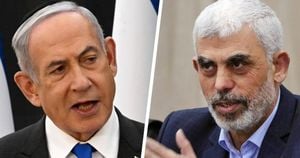New Delhi: India's Defense Minister Rajnath Singh recently engaged in significant international discussions aimed at enhancing the country's military cooperation during his trip to Vientiane, Laos, where he attended the ASEAN Defense Ministers’ Meeting Plus (ADMM-Plus). This gathering, bringing together ten ASEAN nations along with dialogue partners including India, China, Australia, and the United States, served as the backdrop for Singh's bilateral talks with various counterparts.
One of the primary topics was the potential signing of a reciprocal provision of supply and services agreement between India and Japan. During discussions with Japan's Defense Minister Gen Nakatani, both leaders focused on improving interoperability between their military forces—essentially ensuring they can work seamlessly together. This necessity stems from shared concerns over China's increasing military assertiveness, particularly in strategic waters.
The proposed pact aims to allow Indian and Japanese militaries to use each other's facilities for repairs and resupply operations, potentially bolstering their cooperative defense efforts. Singh highlighted the importance of mutual engagement, remarking, “To improve interoperability between the Indian and Japanese forces, we discussed several aspects of defense cooperation.”
At the meeting, both ministers also touched on the co-production and co-development of defense technologies. A milestone event was the recent signing of the Memorandum of Implementation for the UNICORN (Unified Complex Radio Antenna) mast, which plays a pivotal role in enhancing the stealth capabilities of naval vessels. Both parties expressed enthusiasm for collaborating on defense manufacturing, paving the way for more advanced military technologies.
Bilateral talks extended beyond Japan. Singh met with the Philippines’ Defense Minister Gilberto Teodoro, emphasizing the need to deepen joint cooperation across various areas, including military exchanges, defense industries, and counter-terrorism endeavors. This meeting underlined India's commitment to strengthening ties with Southeast Asian nations, particularly as regional dynamics continue to evolve.
Before returning to India, Singh took time to visit the Wat Sisakat temple, greeting the Buddhist Abbot Mahaveth Chittakaro, indicating the cultural exchanges often accompany diplomatic discussions.
Singh's visit and the dialogues held over the past few days reflect India's proactive approach to defense diplomacy. Amid the growing concerns about regional stability, India is not just participating but leading discussions about enhancing mutual defense capabilities and forging stronger ties with allies.
ASEAN’s significance cannot be overstated, especially as it serves as a platform for dialogue among countries dealing with similar security challenges. The ADMM-Plus sought to address these issues collectively, which is increasingly seen as necessary for maintaining regional peace. With Singh's emphasis on cooperative security measures, India aims to assert itself as a key player within the Asia-Pacific's security architecture.
Rajnath Singh’s engagements reflect India’s broader strategy of bolstering defense ties with partners, ensuring preparedness against common threats, and collaborating on technology and innovation within the military domain. These endeavors are pivotal as nations revisit and reinforce their strategic alliances for future challenges.



